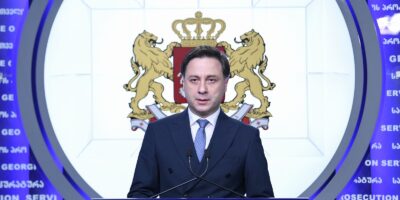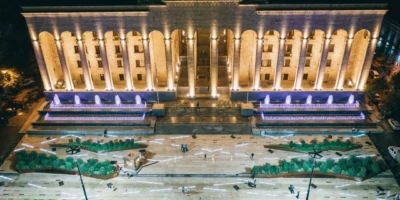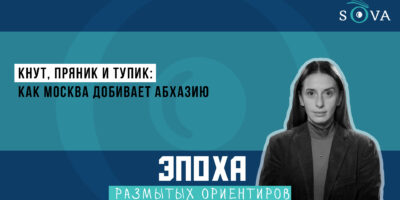Translated by Adrian Bader
On February 5th, parliament majority leader Mamuka Mdinaradze announced a new law limiting the media’s activity and introducing direct censorship. According to the deputy, they plan to instate standards for the objectivity of media and also for journalists’ ethics. Institutionalized monitoring mechanisms should be defined and compliance with standards should be ensured. Media organizations financed by foreign sources will be limited.
“Generally speaking, these so-called norms are called BBC standards and are in use in Britain today. In this case, we are introducing legislation based on British norms that is suitable for the Georgian media market to protect our citizens from lies and maintain the maximum guarantee of foreign non-interference.”
Mdinaradze at this time also reported plans to accept a “Georgian version of America’s FARA” (Foreign Agents Restriction Act, a law restricting foreign agents). The majority leader called the “Russian” law against foreign agents approved in the spring of 2024 a weaker version of FARA. He didn’t disclose any other details.
Two days earlier, on February 3rd, it came out that authorities were considering another series of “Draconian” amendments. These would need to be included in the Administration and Criminal Codes of Georgia. This was already the second wave of repressive laws initiated after the parliamentary elections. Mdinaradze promised that this parliament wouldn’t stop, “there will be many tightenings of administrative punishments”.
The repressive laws are being considered in an accelerated format and can be approved by the end of the week. They were added to the agenda days after the spring parliament session began.
- Restrictions on holding rallies and demonstrations
- Ban of protests in private properties without the owner’s permission
- Introduction of fines and administrative arrest for blocking doors to buildings, highways, bridges, and other infrastructure
- Right of MIA (Ministry of Internal Affairs) to stop demonstrations and prohibit them from being held without clear criteria
- Tightening of organizers’ liability
- Expansion of the definition of protest “organizer” to allow a larger group of people to be held accountable
- Organizers will need to notify the municipality of protest occurrences
- Increase of sanctions for administrative offenses:
- Detention periods will be increased to 60 days
- Insult of an official now classified as an administrative offense
- Fines for light hooliganism, vandalism, disobedience or insult to law enforcement’s demands, blocking entrances to court buildings, and other similar administrative offenses
- Criminal liability for protests:
- Public calls for violence will be punishable by fines, public work, or imprisonment of up to three years
- Resistance or violence to authority figures will be punished by imprisonment of two to 12 years depending on the circumstance
- Threat of violence to government workers will be punished by imprisonment of up to six years
A new initiative limiting civil rights for Georgia residents was first announced a day before the spring session’s opening, the day after a large-scale rally by the Tbilisi Mall near the capital.
During the protest, three dozen people were detained. High-ranking MIA officials were among the security forces who used violence against many of them. During this, eight people were also arrested near the Tbilisi Mall for administrative offenses; after charges were increased, their cases were reclassified as criminal. MIA is now accusing them of attempting a group blockade of a strategic or important object.
Interestingly, a couple of days before the rally the authorities quickly changed what was on the list of objects with strategic and/or special importance. On January 31st, after the announcement of the protest, Prime Minister Irakli Kobakhidze signed a decree adding international highways to the list.
In correspondence with Article 222 of Georgian Criminal Code, blocking of a strategic object is punishable by imprisonment up to two years and doing so in a group results in two to four years time.
The first broad group of repressive laws was adopted by Georgian Dream on New Year’s Eve. A large part of the amendments adopted at the end of December involved stricter legislation regarding protestors:
- Restrictions on holding protests:
- Stricter laws for drivers joining the protest march. Traffic violations can result in a 1,000 GEL fine and loss of driver’s license for a year
- Placing protest materials (posters, stencils) without permission is punishable by a 1,000 GEL fine
- Blocking the road during protests can result in a 5,000 GEL fine for every participant and up to 15,000 GEL for organizers. An administrative arrest of up to 15 days is also possible in place of the fine
- Preventive detention:
- Police receive the right to detain people for up to 48 hours based on the assumption that they might commit a crime if they had earlier been observed doing so. Appealing such a detention requires passing through all judicial authorities, meaning the process is long and complicated
- Sanctions against the use of pyrotechnics, laser devices, and face coverings:
- Presence of pyrotechnics, even if not used, results in a 5,000 GEL fine or administrative arrest of up to 15 days
- Use of laser devices that can interfere with authorities work is punishable by a 2,000 GEL fine
- Covering the face with a mask or any other means inflicts a 2,000 GEL fine
- Liability of minors and their parents:
- If a minor participating in a protest violates a law, their parents can be fined 100-300 GEL for “improper parenting”
- Changes to electoral code:
- Increase of majority component in local elections, which, according to experts, may strengthen the ruling party’s influence.
Along with these repressive laws, mainly aimed at civil rights, deputies from Georgian Dream intend to repress relations with political opponents. On February 5th, there was a temporary investigative commission created in parliament tasked with evaluating former powers’ actions (2003-2012).
The ruling party considers the investigation of the systemic crimes committed over the last nine years by the “agent regime” during the Saakashvili rule fundamentally important. The commission’s main target is the United National Movement, but since authorities call pro-Western parties as a whole a collective National Movement, the entire opposition may be under attack.
“We need some type of Nuremberg trial so that Georgia never returns to its dark past,” Prime Minister Kobakhidze said.
At the same time, Georgian Dream had to go around regulations established by the parliament code. At least half of the members of the temporary investigative commission need to represent the opposition. But since the actual opposition–the four parties who overcame the 5% threshold in elections–boycotted parliament’s work, the authorities had to create one artificially. The members of the People’s Power party, who participated in elections with the Georgian Dream coalition, left the parliamentary majority. The European Socialists party also decided to do so. Thus, Georgian parliament technically ceased to be single-party.







